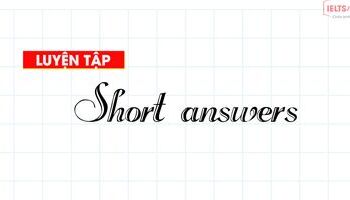Nếu theo dõi các bài học trên IELTS Fighter chia sẻ thì những dạng YES/NO/NOT GIVEN, dạng câu hỏi True, False, Not Given; Matching Paragraph Headings hay Multiple Choice .... được chia sẻ khá nhiều. Hôm nay, bài học sẽ cung cấp những lời khuyên cho dạng bài Short answers (Câu trả lời ngắn) trong IELTS reading để bạn ghi trọn điểm cho dạng bài tập này.
- Bạn đoán được gì từ tiêu đề?
- Đọc lướt đoạn 1. Chủ đề đoạn 1 là gì?
- Các khía cạnh của chủ đề?
- Loại ngôn ngữ như thế nào bạn mong muốn gặp trong bài?
- Bài viết có kèm ví dụ không? Nếu có, ví dụ đó về cái gì?
|
Education Industry Revving Up A recent newspaper investigation into the growing number of foreign fee-paying students raises some issues for timely reflection. To be blunt, we need to prepare ourselves for a sudden and major increase in population. This new population will not be permanent but it will continue to increase in numbers and make itself at home in New Zealand for the main purpose of intellectual advancement. It will, in effect, be a rotating population but one that produces an increase in the total population at any one time. If you think, as even some Asian students do, that Auckland is already too Asian (one in eight Aucklanders is now Asian), be prepared for it becoming too European or too South American. Our booming education industry still catches some locals by surprise and, depending on your point of view about racial diversity, it may or may not be of comfort to know that it has only just begun. The only limitations to its growth will be the decisions and behaviour of organizations serving these students from overseas who want to study here - whether it is English language or IT skills. And I do not mean just the education function itself: it includes health, transport, property and entertainment. The list increases into all aspects of society as more students arrive from the major continents. My own company has grown 500 per cent in the past four years and our board is anticipating an even higher rate over the next five years. I see no reason we should consider industry growth expectations below this. Early next month we will open a new international language school in Queen St designed to give students internationally accredited English language skills so they can stay longer and study IT courses. Some will go on to our universities. This one new school alone will inject an extra $60 million-odd annually into Auckland's economy. What does this industry growth mean? It could mean a $10 billion (contribution to gross domestic product) industry by the end of this decade, employing 100,000 New Zealanders directly and many more indirectly. The conditions which have created this opportunity are many, but underlying them all are the standards which shape education in this country. Some will argue that whimsical circumstances, such as a favourable exchange rate or our distance from the troubled areas of the world, have caused it all. But without the right internationally recognised education standards we would have no such booming industry. Make no mistake, this is our trump card. As long as we are known for quality education we can develop what we have started regardless of almost any other change of circumstance. Undoubtedly, there are financial benefits for society. But we would be blind not to acknowledge and address the many other implications which the newspaper article began to identify. The growth opportunity is so good that we must effectively evolve as an industry and fast, too. We must eliminate the clumsy, experimental mistake-ridden phase of youth. Fundamentally we must leap from childhood to maturity. But how? Experiences in my company lead me to suggest three main areas to address - total service, performance regulation and long-term planning. By total service I mean accepting some responsibility for students inside and outside of campus. Within two years, my company expects at least 1000 overseas students to be studying at all our six campuses. We must take some responsibility for this size of customer base, as any normal company would. This means we must attract other suppliers as dedicated partners with us - property, insurance, healthcare, transport, social support, the list goes on. Education New Zealand has a valuable role here. This type of care begins in the students' countries of origin, ensuring they have correct information about our country and how different it will be in many small and large ways. Our company, intent on achieving this, is introducing marketing programmes in three continents. Performance regulation will be vital in our leap to adulthood. We cannot leave it up to the Government; it will mean a private sector-Government partnership. I am also not surprised to hear calls for the Government to introduce an industry levy - frankly, just another tax - to "protect" standards. We should keep in mind that foreign students are happy to come here because of our stable Government, virtually non-existent corruption, and education standards. For the Government to come to our support with an extra levy imposition reminds me of an old saying: When a sufficient number of management layers are superimposed on top of each other, it can be assured that disaster is not left to chance. Long-term planning usually begins with a vision agreed by the industry and I will support any immediate efforts in this area. We now have an industry that is arguably our country's third largest export earner. We need to know where we can take this industry, how it fits with society and its place in an increasingly systemic world where people move more freely and technology drives a global economy. |
Hãy nhớ rằng với dạng câu hỏi TRUE, FALSE, NOT GIVEN, trước tiên bạn nên nhìn xem nhận định được đưa ra có đúng với thông tin trong bài không? Nếu có thì nhận định sẽ là “TRUE”. Nếu không, nó chắc chắn phải là FALSE hoặc NOT GIVEN. Nếu không có gì để khẳng định nó sai, vậy thì nó có thể là đúng hoặc sai nhưng bạn không biết - tức là từ thông tin đưa ra bạn không thể khẳng định được.
Dạng câu hỏi đưa ra câu trả lời ngắn của IELTS
Mẹo:
- Đọc hướng dẫn thật kĩ – chúng sẽ cho bạn biết số lượng từ bạn được dùng (trong trường hợp này là tối đa 3 từ).
- Trong IELTS dạng câu hỏi đưa ra câu trả lời ngắn, bạn nên sử dụng từ ở trong bài đọc hơn là từ của bạn, và đừng thay đổi các từ đó.
- Đọc nhanh qua tất cả các câu hỏi để nắm được những thông tin mà bạn cần phải tìm trong bài đọc.
- Sử dụng các từ khóa trong câu hỏi để giúp bạn lướt qua bài đọc 1 cách nhanh chóng để tìm thông tin. VÍ dụ, trong câu đầu tiên, bạn sẽ phải tìm “type of care”.
- Hãy nhớ rằng, các từ đồng nghĩa cũng sẽ được sử dụng, nên bạn phải cẩn thận khi tìm thông tin.
- Đọc đoạn mà bạn biết rằng có câu trả lời thật kỹ để tìm ra những từ trả lời cho câu hỏi.
- Câu trả lời của bạn phải có nghĩa và đúng ngữ pháp
Bây giờ chúng ta sẽ vận dụng những chú ý và lời khuyên ở trên và trả lời những câu hỏi cho dạng bài này dưới đây. Bạn có thể viết câu trả lời của bạn dưới mỗi câu hỏi và ấn vào phần cuối để xem câu trả lời.
Thảo luận đáp án cho phần 1
- The new residents will stay in New Zealand forever? F
This new population may not be permanentbut...(đoạn 1)
- The main reason these people are in New Zealand is to progress academically. T
...in New Zealand for the main purpose of intellectual advancement. (đoạn 1)
- There are many Vietnamese people living in New Zealand. NG
Auckland is already too Asian (1 trong 8 Aucklanders bây giờ là Asian), (đoạn 2) – chúng ta được cung cấp thông tin răng Asians ở Auckland nhưng chúng ta không biết họ đến từ đất nước nào
- The success of the education industry has been happening for many years. F
Our booming education industry...to know that it has only just begun. ( đoạn 2)
- People from Auckland are surprised at the number of Asian students there are. NG
Our booming education industry still catches some locals by surprise.(đoạn 2) – từ 'surprise' được nhắc đến ở đây nhưng nó không liên quan đến việc ngạc nhiên về số lượng học sinh Châu Á. Mọi người có thể ngạc nhiên nhưng chúng ta không biết được. Thông tin này không được đưa ra trong đoạn
- All students want to study English and IT. NG
...these students from overseas who want to study here - whether it is English language or IT skills. (đoạn 3) – Rất có thể rằng tất cả học sinh đều muốn học Tiếng anh và Công nghệ thông tin, nhưng chúng ta không biết điều này đúng hay không. Có thể có thêm những môn học khác
- The writer’s company has increased in size over the last few years. T
My own company has grown 500 per cent in the past four years. (đoạn. 4)
- The country’s financial situation will benefit from overseas students. T
will inject an extra $60 million-odd annually into Auckland's economy. (đoạn 5)
- There will be less jobs for native speakers in the future. F
employing 100,000 New Zealanders directly and many more indirectly. (đoạn 5)
- According to the writer, New Zealand's exchange rate and location underpin the opportunities available..F
...without the right internationally recognised education standards we would have no such booming industry.(đoạn. 6)
Trên đây bài chia sẻ về mẹo làm bài dạng Short answers (Câu trả lời ngắn) trong Reading. Nếu trong quá trình học các bạn có bất cứ thắc mắc hãy comment tại bài viết hoặc inbox trực tiếp cho IELTS Fighter qua page IELTS fighter - Chiến binh IELTS để được giải đáp cụ thể nhé.
| Bạn có thể tham khảo thêm bài học khác:
|
Chúc các bạn luôn chăm chỉ và học tập thật tốt!





